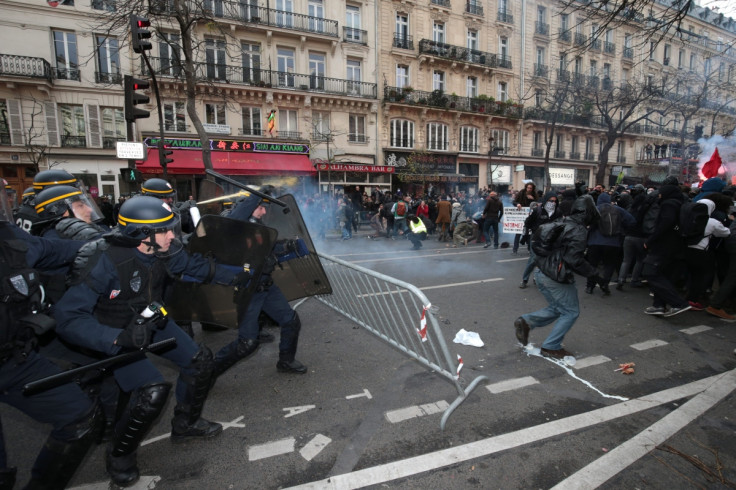COP21: Riot police detain 100 climate change protesters as tear gas fired in Paris

As thousands gather in cities across the globe for a worldwide Climate March, roughly 100 demonstrators were detained in France after clashing with police in Paris' Place de la Republique square. The Climate March in Paris was banned amid heightened security following the terrorist attacks that killed 130 people on 13 November.
Despite the ban on public demonstrations, thousands gathered in central Paris on Sunday (29 November) and formed a human chain along the route of the planned march. However, police were filmed firing tear gas at the demonstrators and some witnesses described objects flying in the direction of security officers.
La Republique metro station was closed shortly after demonstrators clashed with Paris police and eyewitnesses filmed the heavy presence of riot police on the scene. Videos have emerged showing people running away from large clouds of tear gas. Some protesters were reported to be chanting: "State of emergency, police state, you will not deprive us of our right to demonstrate."
Demonstrators clash with CRS riot policemen near the Place de la #Republique, #ParisREUTERS/Eric Gaillard #COP21 pic.twitter.com/urkyftA2jt
— Reuters Paris Pix (@ReutersParisPix) November 29, 2015Unauthorised march starting at #Republique #Paris #climate pic.twitter.com/155jTlTiit
— Rachel Dobric (@racheldobric) November 29, 2015Lacrymo again
#republique #cop21 pic.twitter.com/03oOq15k5l
— hajoura74 (@hajoura74) November 29, 2015#Republique Meydanı. Polis göstericilerin en az 5 katı kalabalık. Darp etmiş, yaralılar var. Yerel medya vermiyor. pic.twitter.com/jWsoTbB7QF
— Mehmet Akif Özdemir (@ma_ozdemir) November 29, 2015The human chain demonstration was one of many alternatives devised by activists in Paris following the announcement that marches would not be allowed to take place in the city. Ahead of the human chain demonstration, campaign group 350.org explained that the human chain would stretch along the sidewalk and would not disrupt any traffic. They said that people would be holding signs, placards and banners that were originally created for the banned climate march. The group also confirmed that the Paris Police Prefecture had allegedly not prohibited the human chain event.
"Hundreds of thousands of people were expected to take part in the climate march in Paris, but the event was banned by the French authorities," a spokesperson for 350.org said. "Political gatherings of more than two people have been banned in Paris and numerous activists have been placed under house arrest, raising concerns over a broader crackdown on civil liberties. The main message of the human chain is: we are in a state of climate emergency and we demand a climate of peace."
On Saturday (28 November) French authorities used the state of emergency declared after the terrorist attacks to impose restraining measures on dozens of environmental activists. At least 24 people placed under house arrest or banned from leaving their city of residence. Authorities stated that the measures targeted the "radical protest movement" that they believed were a threat to security.
The Climate March in Paris was due to be the biggest one out of many taking place worldwide as the city hosts the UN Climate Summit that begins on Monday (30 November). Nearly 195 world leaders will be attending the Summit where they will aim to reach a legally binding agreement that sees global warming rise no more than 2C.
Security in the French capital remains tight with nearly 2,800 police officers and soldiers reportedly guarding the Climate Summit venue in the north of Paris. A further 6,300 officers have been deployed across the city.
© Copyright IBTimes 2025. All rights reserved.





















